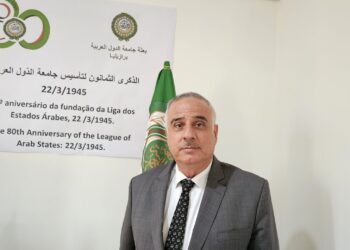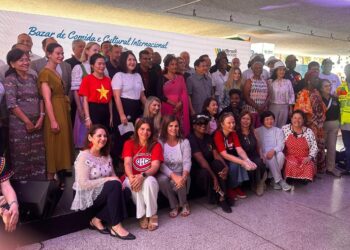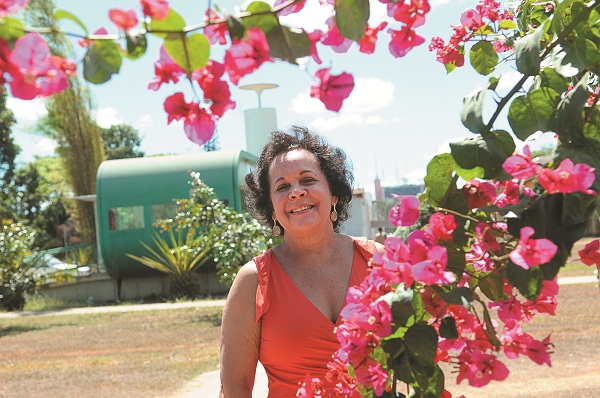[:pb]Ambassador Aydah Alsaidi celebrates the independence of the country and announces gathering for new projects in partnership with Brazil
The Ambassador of Kuwait, Ayadah Alsaidi, celebrated on Wednesday (17), with friends, diplomats and authorities, three important events; the 15th day of independence of the Kuwait State, the 25th anniversary of the liberation and also the 10th anniversary of the mandate of the Emir of Kuwait, Sheikh Sabah Al-Ahmad Al-Jaber Al -Sabah. The ambassador said he was proud of the democratic constitution of the country and respect for human rights. The reception was at the Equestrian Hall in Brasilia and included the presence of the Defense Minister, Aldo Rebelo, who represented the Brazilian government.

Kuwait, according to Ayadah Alsaidi maintains with Brazil a privileged relationship in all areas, established in 1975. “These are relations based on the principles of mutual understanding and respect for UN resolutions and the implementation of the recommendations of international organizations” the ambassador said in his speech. The diplomat reminded the prime minister’s visit Sheikh Nasser Al-Mohammed Al-Ahmad Al-Sabah to Brazil in 2010, leading high level government delegation. The visit resulted, according to Aydah Alsaid, in signing bilateral agreements in various fields between the two countries.
The ambassador reminded the visit of a delegation of Kuwaiti parliamentarians to Brazil in September 2015, when they went to the Chamber of Deputies and to the Senate, and the meeting with the Vice-President Michel Temer. “On this occasion opportunities to advance their diplomatic relations towards wider horizons was discussed, where the means for the development of bilateral relations and areas of cooperation were addressed in various fields, including government relations.
The opportunities for the development of trade and investment between the two countries, in the opinion of Aydah Alsaidi, are numerous and the exchange of high level visits between the two countries “is a practical and successful way for consolidating relations in different areas”.
Plan of action – According to the Ambassador, the Embassy action plan consists of making an economic forum and investment between the two countries, as well as a cultural Kuwaiti week in Brazil. “The embassy is coordinating with the Brazilian authorities to hold a meeting of the Joint Committee Kuwait-Brazil in May” said Aydah Alsaidi.

According to Ayadah Alsaidi, Kuwait gained international respect thanks to humanitarian aid and development policies adopted since its establishment. “The Kuwait enjoys stability and internal security and adopt a peaceful diplomatic policy with different countries of the world and succeeded, despite of all of the difficulties faced, in attracting foreign investments in different sectors”, said the ambassador.
The Minister of Defense Aldo Rebelo said in his speech that Brazil has a large community of Arab origin, who has given outstanding cultural contribution to the country. “Today I wish that Kuwait get deep and lasting foundations for the development of mankind”, he said. Aldo Rebelo recalled that Brazil maintains diplomatic relations with Kuwait since 1968, only seven years after the independence of that country.
History – Kuwait, officially the State of Kuwait is a sovereign Arab emirate situated in the northeast of the Arabian Peninsula in Western Asia. It borders Saudi Arabia to the south and Iraq at north. It lies on the northwest coast of the Persian Gulf. The Kuwait name is derived from the Arabic “akwat”, the plural of “Kout” meaning “fortress built near water”.
Historically, the region was known as Caracena, a major port for trade between India and Mesopotamia. The Bani Utbah tribe was the first permanent Arab community in the region and established the modern basis of the emirate. In the nineteenth century, Kuwait was under the influence of the Ottoman Empire after the First World War emerged as an independent sheikhdom under the protection of the British Empire. Large oil fields were discovered in the country in the 1930s.
After Kuwait won the UK’s independence on February 25 in 1961, the oil industry of the country recorded an unprecedented economic growth. In 1990, Kuwait was invaded and annexed by neighboring Iraq. The seven-month Iraqi occupation came to an end after a direct military intervention by the forces led by the United States.
Kuwait is a constitutional monarchy with a parliamentary system of government having the City of Kuwait as political and economic capital of the country. The Kuwait has the world’s fifth largest oil reserves, petroleum products now account for about 95% of export earnings and 80% of the country’s government income. The Kuwait has the eleventh highest GDP per capita in the world and has the highest human development index (HDI) of the Arab world. The Kuwait is classified as a high-income economy by the World Bank and is designated as a major ally non-US NATO member.

Data nacional do Kuaite
Embaixador Aydah Alsaidi festeja independência do país e anuncia reunião para novos projetos em parceria com o Brasil
O Embaixador do kuaite, Ayadah Mubrad Alsaidi, comemorou, nessa quarta-feira (17), com amigos, diplomatas e autoridades, três eventos importantes; a 15ª data da independência do Estado do Kuaite, o 25º aniversário da libertação e ainda o 10º aniversário do mandato do Emir do Kuaite, o Sheikh Sabah Al- Ahmad Al-Jaber Al -Sabah. O embaixador se disse orgulhoso da Constituição democrática do país e do respeito pelos direitos humanos. A recepção foi no Hípica Hall, em Brasília, e contou com a presença do Ministro da Defesa, Aldo Rebelo, que representou o governo brasileiro.

O Kuaite, de acordo com o Ayadah Alsaidi, mantém com do Brasil uma relação privilegiada em todas as áreas desde 1975. “São relações baseadas nos princípios de mútuo entendimento e respeito às resoluções das Nações Unidas e à implementação das recomendações dos Organismos Internacionais”, disse o embaixador em seu discurso. O diplomata lembrou a visita do primeiro-ministro Sheikh Nasser Al Mohammed Al Ahmad Al Sabah ao Brasil, em 2010, liderando uma delegação governamental de alto nível. A visita resultou, de acordo com Ayadah Alsaidi, na assinatura de acordos bilaterais em diversas áreas entre os dois países.
O embaixador lembrou ainda da visita de uma delegação de parlamentares kuaitianos ao Brasil em setembro de 2015, quando foram à Câmara Federal e ao Senado Federal, como ainda da reunião realizada com o Vice-Presidente Michel Temer. “Nessa ocasião foram discutidas as oportunidades para se avançar com as relações diplomáticas rumo a horizontes mais amplos, onde foram tratados os meios para o desenvolvimento das relações bilaterais e as áreas de cooperação em diversos campos, inclusive no de relações governamentais”, disse o diplomata.
As oportunidades existentes para o desenvolvimento do comércio e do investimento entre os dois países, na opinião de Aydah Alsaidi, são inúmeras e a troca de visitas de alto nível entre os dois países, “representa uma forma prática e bem sucedida para a consolidação das relações nas diferentes áreas”.
Plano de ação – De acordo com o embaixador, o plano de ação da Embaixada consiste na realização de um fórum econômico e de investimentos entre os dois países, além de uma semana cultural Kuaitiana no Brasil. “A Embaixada está coordenando, com as autoridades brasileiras, a realização de uma reunião da comissão mista kuaite-Brasil, no mês de maio próximo”, anunciou Ayadah Alsaidi.

Segundo Ayadah Alsaidi, o Kuaite ganhou o respeito a nível internacional graças às políticas de ajuda humanitária e de desenvolvimento adotadas desde seu estabelecimento. “O Kuaite dispõe de estabilidade e segurança interna, além de adotar a política diplomática pacífica com os diferentes países do mundo conseguindo, apesar de todas as dificuldades enfrentadas, atrair investimentos estrangeiros em diferentes setores”, afirmou o embaixador.
O Ministro da Defesa Aldo Rebelo disse, em seu pronunciamento, que o Brasil possui uma grande comunidade de origem árabe, a qual tem dado relevante contribuição ao país. “Desejo nessa data que o Kuaite ganhe alicerces profundos e duradouros para o maior desenvolvimento”, afirmou. Aldo Rebelo lembrou que o Brasil mantém relações diplomáticas com o Kuaite desde 1968, apenas sete anos após a independência daquele país.
História – O Kuaite, oficialmente Estado do Kuaite, é um emirado árabe soberano situado no nordeste da península Arábica na Ásia Ocidental. Faz fronteira com a Arábia Saudita ao sul e ao norte com o Iraque. Encontra-se na costa noroeste do Golfo Pérsico. O nome Kuaite é derivado do árabe “akwat”, o plural de “Kout”, que significa “fortaleza construída perto da água”.
Historicamente, a região era conhecida como Caracena, um grande porto parta para o comércio entre a Índia e a Mesopotâmia. Os membros da tribo Bani Utbah foram os primeiros colonos árabes permanentes na região e estabeleceram as bases modernas do emirado. No século XIX, o Kuaite estava sob a influência do Império Otomano e depois da Primeira Guerra Mundial, ele emergiu como um mercado independente sob a proteção do Império Britânico. Grandes campos de petróleo no país foram descobertos na década de 1930.
Após o Kuaite ter conquistado a independência do Reino Unido, em 25 de fevereiro em 1961, a indústria de petróleo do país registrou um crescimento econômico sem precedentes. Em 1990, o Kuaite foi invadido e anexado pelo vizinho Iraque. Os sete meses de ocupação iraquiana chegaram ao fim depois de uma intervenção militar direta por parte das forças lideradas pelos Estados Unidos.
O Kuaite é uma monarquia constitucional com um sistema parlamentar de governo tendo a Cidade do Kuaite como capital política e econômica do país. O Kuaite tem a quinta maior reserva de petróleo do mundo e os derivados de petróleo representam agora cerca de 95% das receitas de exportação e 80% da renda do governo do país. O Kuaite tem o décimo primeiro maior PIB per capita do planeta e o maior índice de desenvolvimento humano (IDH) do mundo árabe. O Kuaite é classificado como uma economia de alta renda pelo Banco Mundial e é designado como um grande aliado não membro da OTAN dos Estados Unidos.










